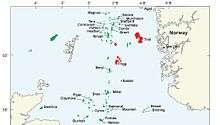Frigg gas field
| Frigg gas field | |
|---|---|
 North Sea Oil and Gas Fields | |
 Location of Frigg gas field | |
| Country | Norway |
| Region | North Sea |
| Location/block | 25/1 |
| Offshore/onshore | Offshore |
| Coordinates | 59°52′48.48″N 2°3′59.40″E / 59.8801333°N 2.0665000°ECoordinates: 59°52′48.48″N 2°3′59.40″E / 59.8801333°N 2.0665000°E |
| Operator | Total S.A. |
| Field history | |
| Discovery | 1971 |
| Start of production | 8 May 1978 |
| Abandonment | 26 October 2004 |
| Production | |
| Estimated gas in place | 6,780×109 cu ft (192×109 m3) |
Frigg gas field is a natural gas field on Norwegian block 25/1[1] in the North Sea, on the boundary between the United Kingdom and Norway. The field is named after the goddess Frigg. King Olav V of Norway officially opened production on 8 May 1978. Production was closed on 26 October 2004. The field is situated 230 kilometres (140 mi) northwest of Stavanger. Operator for the field was the French oil company Elf Aquitaine, which merged and changed name to Total S.A.
Operations were regulated according to an agreement between the UK and Norwegian governments called the Frigg Treaty.
Infrastructural changes were made in three phases:
- Phase I - 1977
- Phase II - 1978
- Phase III - 1981
Geology
The field was discovered at a depth of 1,850 metres (6,070 ft) by the Petronord group (Elf Aquitaine, Total Oil Marine Norsk, and Norsk Hydro) and the Norwegian State in 1971 with Well 25/1-1 using the Semi-submersible Neptune P 81 in 100 metres (330 ft) of water.[2] The well was located following interpretation of a 15 by 20 km grid of Reflection seismology lines recorded in 1965.[2] A 5 by 5 km finer grid of seismic lines were recorded in 1969, followed by a 1 by 1 km grid in 1973, combined with four appraisal wells determined the field was 115 square kilometres (44 sq mi) in area with a 170-metre (560 ft) gas column in Lower Eocene sandstones forming an abyssal fan in the Viking Structural basin.[2] The fan structure appears on seismic sections as a low relief Anticline that includes a Flat spot caused by the Density contrast of the gas.[3]
Pipelines connected to the Frigg field
- Frigg UK System - natural gas transportation system from the Alwyn North Field in the North Sea via the Frigg field to St. Fergus near Peterhead in Scotland. The Frigg UK System is operated by Total E&P UK Plc.
- Vesterled - mostly the former Frigg Norwegian Pipeline
Images
 Bridge from the Frigg field outside the Norwegian Petroleum Museum in Stavanger
Bridge from the Frigg field outside the Norwegian Petroleum Museum in Stavanger
References
Bibliography
- Heritier, F E; Lossel, P; Wathne, E (1980). "Frigg Field-Large Submarine-Fan Trap in Lower Eocene Rocks of the Viking Graben, North Sea". In Halbouty, Michel Thomas. Giant Oil and Gas Fields of the Decade:1968–1978. AAPG Memoir 30. Tulsa: American Association of Petroleum Geologists. ISBN 0891813063. OCLC 7355859.
External links
- Frigg Industrial Heritage - a website by the Norwegian Petroleum Museum, English version
- Frigg decommissioning - at the website of Total E&P Norge
- Frigg UK: 30 Years on
- Frigg in Interactive Energy Map
